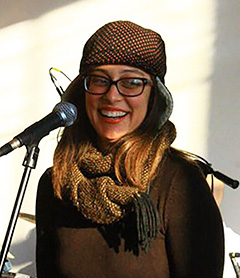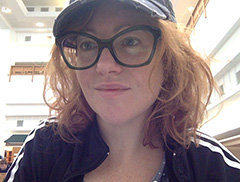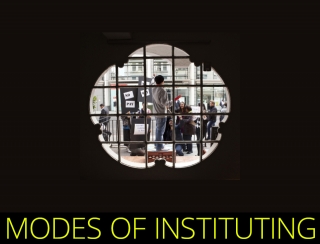Techniques for Living Otherwise: Instituting with Care
This workshop emerges out of our work on alternatives to practices of Public Programming in contemporary cultural institutions. Arguing that the proliferation of public platforms over the last decades, and their various calls to institutional critique and ‘new institutionalism’, do little to address the urgent social and political issues they thematise, we suggest such programmes often further detach contemporary urgencies from everyday practices of instituting. To counter this effect, we draw from genealogies of public gathering and organising practices emerged within social movements, Institutional Analysis, and histories of partisan and anti-colonial struggles to produce modes of instituting able to make public in ways that do not exclude what is often relegated to the ‘private’: the caring, the repairing and the reproductive dimensions of life.
Taking inspiration from the École moderne movement, we draw the workshop’s title from the notion of ‘techniques for living otherwise’, which emerged as an early call to institutional analysis and change based in vital and joyful life practices. In this workshop we will look at practices drawn from this and other political and pedagogical histories to imagine with the participants how to develop institutions that begin from questions of social reproduction.
SCHEDULE
DAY 1 - What is an Institution? A Living Dictionary
Drawing from our own practices and key thinkers, we will map and draw the various definitions of institution and instituting participants are working with. Throughout the day, through a number of short ‘teach-ins’ we will introduce a range of definitions of institutions and instituting in our own work, such as those developed by Ivan Illich, Chicana housing organisers, Felix Guattari and Gisele Pankow, Audre Lorde and others to map an emerging definition of Instituent and Institution.
DAY 2 - Genealogies at Work
On the second day we will invite participants to work on investigating a number of archives related to living and instituting otherwise. Working with this material, they will develop an analysis of such genealogies, attempt to perform one of their technologies of organisation, and explore their implications for the contexts in which they are working. We will bring materials, films, and texts for them to work with.
DAY 3 - Instituting Futures
One of the strongest barriers in instituting otherwise is our incapacity to imagine the world otherwise. This last session will introduce speculative methodologies to invite people to imagine how to work in a chosen mode of instituting tomorrow, one year and ten years from today.

BIOGRAPHIES
Dr. Janna Graham is a Lecturer at Goldsmiths, University of London. She has worked as an educator, organiser, researcher and curator between social movements, arts institutions and research processes for many years. She has occupied curatorial and research positions at Nottingham Contemporary, Serpentine Galleries, the Whitechapel and the Art Gallery of Ontario, among others. From 2008 to 2014 she worked with local people to create the Centre for Possible Studies, a para-institution linking art, popular education and radical research in London’s Edgware Road neighbourhood, with publications including Edgware Road (Koenig, 2010), Studies on a Road (2013) and Art + Care: A future (2013). Her research investigates histories of radical research and education for practices of ‘thinking with conditions’, modes of analysis and action that unravel and re-work the contradictions born of contemporary capitalism, as they are experienced by cultural workers and communities. Her current work looks at histories of anti-racism and their implications for institutional change processes in cultural institutions, counter-institutions of care generated by refugee groups, and genealogies of Institutional Programming and Analysis for generating caring, joyful, horizontal and poly-vocal organisations. She is a founding member of the Another Roadmap Network, involving researchers in 22 countries analysing intertwining histories of arts education, and a member of the sound art and political collective Ultra-red.
 Dr. Valeria Graziano is a Research Fellow at the Centre for Postdigital Cultures, Coventry University, UK. Her research looks at the organization of cultural practices that foster the refusal of work and the possibility of political pleasure. Her approach is informed by autonomist Marxism, institutional analysis, materialist transfeminism, and critical organization theory.
Dr. Valeria Graziano is a Research Fellow at the Centre for Postdigital Cultures, Coventry University, UK. Her research looks at the organization of cultural practices that foster the refusal of work and the possibility of political pleasure. Her approach is informed by autonomist Marxism, institutional analysis, materialist transfeminism, and critical organization theory.As a practitioner, she has developed projects for the Estonian Contemporary Art Museum; Kampnagel; Impulse Theatre Festival; Wyspa Institute; Intermediae; In-Presentable; Steirischer Herbst, Manifesta 7 and Vanabbemuseum, among others, and has given talks across a number of cultural organisations, including Institute for Network Cultures, Moderna Museet and documenta 14. She carried out commissioned research for Arts Collaborative Network, Serpentine Gallery and Bristol Visual Arts Consortium. Currently, Valeria is the convenor of the international project Pirate Care (pirate.care), fostering a transnational network of activists, researchers and practitioners against the criminalization of solidarity and for a common care infrastructure, and working with WeMake (Milan) on a research investigating the relationship between open technologies and healthcare, supported by the EU Horizon 2020 scheme DSI4EU. Together with Dr Kim Trogal (UCA), from 2017 to the present she has been working on the trope of ‘repair and maintenance‘ across different collective practices, inspired by feminist and degrowth pedagogies. She is co-editor of Repair Matters, a special issue of ephemera: theory and politics in organisation (May 2019).
Graham and Graziano together with Susan Kelly, have, since 2013, developed the Public Programming, a research collaboration bringing together cultural workers, activists and researchers to discuss the acceleration of public pedagogical events in relation to post-democratic tendencies (publication forthcoming). They are both founding members of the Network for Institutional Analysis (UK).
